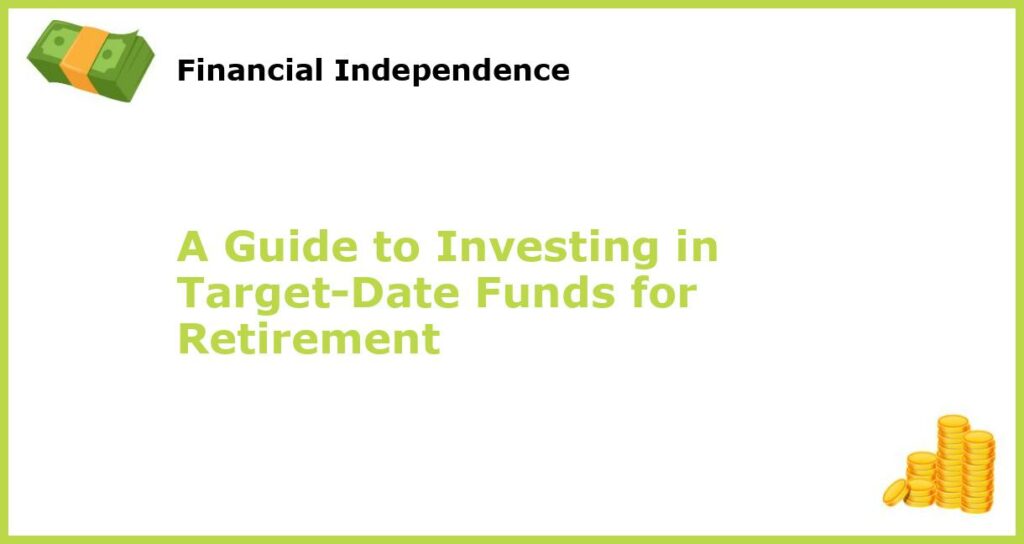Are you planning for your retirement, but not sure where to start? Don’t worry! Target-date funds are an excellent investment vehicle that automatically adjusts the asset mix to become more conservative as the target date approaches. These funds are commonly used for retirement accounts and are designed for investors who want a hands-off approach to investing. In this article, we’ll guide you through the basics of target-date funds, understanding the target-date, diversification, risk tolerance, automatic rebalancing, fees, performance and returns, benefits, risks, and a final word of advice.
The Basics of Target-Date Funds

Target-date funds are a collection of investments that are selected for you, based on the year you are aiming to retire. The fund automatically rebalances its assets allocation as the target date approaches, becoming more conservative over time. These funds are easy to invest in, making them an excellent option for investors who want a simple and straightforward approach to retirement investing.
Understanding the Target-Date

The target-date is the year the investor plans to retire, and the fund adjusts its asset allocation accordingly. The target-date is typically included in the name of the fund, such as “2050 Fund.” It’s important to note that there is not a one-size-fits-all target-date. Each investor has unique goals and needs. Therefore, investors should determine their target date based on their own retirement plans and goals.
The Importance of Diversification

Diversification is crucial because it spreads risk across multiple investments, helping to reduce the risk of the portfolio. Target-date funds provide automatic diversification by investing in a mix of stocks, bonds, and other assets, which provide exposure to multiple asset classes. However, investors should understand that the level of diversification can vary between funds, and they should review the fund’s portfolio before investing to ensure that it aligns with their investment goals and risk tolerance.
Determining the Level of Risk
The level of risk varies between funds, with some having a higher allocation to stocks and others to bonds. Investing in a target-date fund involves determining the amount of risk you are comfortable taking, which varies depending on your age, investment goals, and time horizon. Investors who are far from the target-date and who accept higher risk may invest in funds with higher stock allocations, while investors who are closer to retirement or less tolerant of risk may choose funds with higher bond allocations.
Automatic Rebalancing
Target-date funds gradually shift to more conservative investments as the date approaches the target-date, becoming less and less risky as the investor nears retirement. This helps to ensure that the portfolio is aligned with the investor’s goals and risk tolerance. However, it’s important for investors to understand that automatic rebalancing does not guarantee profit or protect against loss in a declining market.
The Role of Fees
Fees can significantly impact a target-date fund’s performance over time. Investors should be aware of the fees associated with the fund, including expense ratios and transaction fees. Lower fees may lead to better long-term performance, but it’s essential to balance the fees with other key factors, such as diversification, risk tolerance, and the fund’s overall investment strategy.
Performance and Returns
Investors should review the fund’s historical performance and returns before investing. However, past performance does not indicate future results. Target-date funds have varying performance and returns depending on the fund’s asset allocation and investment strategy. Therefore, it is important for investors to have reasonable expectations and make investment decisions based on their needs, goals, and objectives.
Benefits of Target-Date Funds
Target-date funds offer several benefits to investors who want a hands-off approach to investing and are focused on retirement planning. These funds provide automatic diversification, automatic rebalancing, and make investing simple and straightforward by eliminating the need for investors to select individual securities. Additionally, these funds reduce the temptation to time the market.
Risks of Target-Date Funds
Like any other investment, target-date funds come with risks. These risks include market fluctuations, interest rate changes, and economic uncertainty. However, due to their automatic nature, these funds are generally considered lower risk than individual stock picks or bond investments. Investors should carefully review the fund’s portfolio, performance, and fees before investing.
A Final Word of Advice
Irrespective of whether you choose a target-date fund or not, it is essential to carefully consider your investment goals, risk tolerance, and retirement plans before investing. Target-date funds may offer several benefits that make them an excellent option for investors who want a simplified approach to retirement investing, but they are not a one-size-fits-all investment solution. Therefore, it is essential to review multiple funds, conduct thorough research before making a decision, and consult with a financial advisor before investing.







